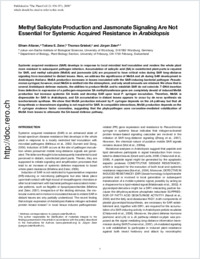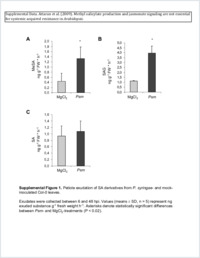Methyl salicylate production and jasmonate signaling are not essential for systemic acquired resistance in Arabidopsis
- Attaran, Elham Julius-von-Sachs-Institute of Biological Sciences, University of Würzburg, Germany
- Zeier, Tatiana E. Department of Biology, Plant Biology Section, University of Fribourg, Switzerland
- Griebel, Thomas Julius-von-Sachs-Institute of Biological Sciences, University of Würzburg, Germany
- Zeier, Jürgen Department of Biology, Plant Biology Section, University of Fribourg, Switzerland
-
27.04.2009
Published in:
- The Plant Cell. - 2009, vol. 21, p. 954-971
English
Systemic acquired resistance (SAR) develops in response to local microbial leaf inoculation and renders the whole plant more resistant to subsequent pathogen infection. Accumulation of salicylic acid (SA) in noninfected plant parts is required for SAR, and methyl salicylate (MeSA) and jasmonate (JA) are proposed to have critical roles during SAR long-distance signaling from inoculated to distant leaves. Here, we address the significance of MeSA and JA during SAR development in Arabidopsis thaliana. MeSA production increases in leaves inoculated with the SAR-inducing bacterial pathogen Pseudomonas syringae; however, most MeSA is emitted into the atmosphere, and only small amounts are retained. We show that in several Arabidopsis defense mutants, the abilities to produce MeSA and to establish SAR do not coincide. T-DNA insertion lines defective in expression of a pathogen-responsive SA methyltransferase gene are completely devoid of induced MeSA production but increase systemic SA levels and develop SAR upon local P. syringae inoculation. Therefore, MeSA is dispensable for SAR in Arabidopsis, and SA accumulation in distant leaves appears to occur by de novo synthesis via isochorismate synthase. We show that MeSA production induced by P. syringae depends on the JA pathway but that JA biosynthesis or downstream signaling is not required for SAR. In compatible interactions, MeSA production depends on the P. syringae virulence factor coronatine, suggesting that the phytopathogen uses coronatine-mediated volatilization of MeSA from leaves to attenuate the SA-based defense pathway.
- Faculty
- Faculté des sciences et de médecine
- Department
- Département de Biologie
- Language
-
- English
- Classification
- Biological sciences
- License
-
License undefined
- Identifiers
-
- RERO DOC 11975
- DOI 10.1105/tpc.108.063164
- Persistent URL
- https://folia.unifr.ch/unifr/documents/301165
Other files
Statistics
Document views: 137
File downloads:
- pdf: 322
- Supplementary material: 135

